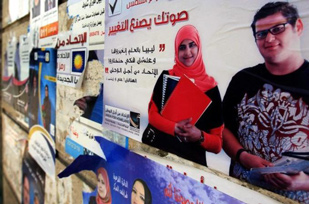

Libyans are set to vote in the country’s first free national elections in over four decades amid violence by federalist protesters who are threatening to boycott or even sabotage the vote.
On Friday, a helicopter carrying election material from Libya’s eastern city of Benghazi was shot at in mid-flight, fatally wounding a member of Libya’s High National Election Committee (HNEC) logistics team onboard.
“The helicopter was on its way from our warehouse in Benghazi to Tukara when it was hit by small arms fire. One young member of the logistics team was hit and the helicopter landed at Benina airport where he was taken to hospital,” Loui El Magari of the HNEC said.
“He died there with many member of logistics team present. The team is back to work now. Everything is ready for tomorrow. Nothing can stop us,” El Magari said.
The incident was only the latest in a string of violent eruptions in the run-up to Saturday’s highly anticipated vote.
The 2.8 million registered voters will elect a 200-seat General National Conference (GNC) on Saturday that will replace the unelected interim government that has ruled the country after the revolution against Libya’s ousted leader Muammar Gaddafi.
The polls are set to open from 8am to 8pm and the interim government, represented by the National Transitional Council (NTC), declared E-day and Sunday national public holidays for voters to exercise their civic duty.
Public service commercials on how the voting process works have been running on TV to support voters ahead of the elections. A large majority of Libyans will be going to the polls in the first time in their lives.
Voters undecided
The 3,700 candidates – 2,500 of whom are independent, the rest belongs to political parties – had until Thursday evening to reach out to voters, as the HNEC declared Friday a “cool-off day” ahead of the vote.
On Friday, many Libyans in Tripoli were still undecided about which candidates to support. Some say they would use the weekend’s family gatherings to make a final decision.
“I have it down to two political parties. I will either vote for Hizb al Wattan [National Party] or the Tahalof al Qiwa Al Wataniye [Alliance of National Forces] of [former prime minister Mahmoud] Jibril,” Manal El Miladi, a 23-year-old medical student from Tripoli, told Al Jazeera.
“I will vote for them of what they wrote in the their [campaign] programme. For the individual candidate race, I also still need to choose between two candidates. I will probably decide this evening. My mom also asked me who she should vote for.”
Huda Muftah, 25, another medical student, said she made up her mind: “I am voting for [the party of] Jibril because he is what Libya needs in these times.
“He is a very educated man with good international connections, plus he has a good plan about what we need in the near future – from all sides. So, for me he is the man of this phase,” she said.
The new assembly will appoint a new cabinet and a prime minister, but will not choose the committee that would draft the country’s first constitution.
The key responsibility to appoint the constitutional committee was stripped away from the assembly by NTC decree on Thursday in a last-minute move to appease the eastern protesters who demand more autonomy for their region.
The mood has been tense in Libya’s second city, Benghazi, and other cities and towns in the eastern Cyrenaica region, where federalist groups have vowed to boycott and even violently disrupt the vote.
Many residents of eastern Libya feel the distribution of seats in the General National Conference favours the west of the country.
The critics say this is a continuation of the alleged marginalisation of their region that they say started decades ago under Gaddafi’s rule.
Seat allocations
The NTC has allotted seats in the GNC according to population, a democratic principle that is viewed with mistrust by the less-populated east.
Federalist protesters in Benghazi broke into the local election offices on Sunday and ransacked them. On Thursday, protesters set fire to a warehouse in the eastern city of Ajdabiya where ballot papers and other campaign material were stored.
All material was lost in the fire, forcing the High National Election Committee to print new ballot papers in Dubai. An official said the group “could only hope” that everything could be replaced before Saturday morning.
Tribal clashes in the country’s isolated Kufra region in the far south have prevented election observers to visit the district, making it unlike that the vote will proceed there.
When polls close on Saturday evening, the Libyan Air Force will assist with collecting the ballot papers from across the vast county and bring them to a counting centre in Tripoli, the HNEC said.
It is almost impossible to predict the outcome of the vote, as Libya is hardly familiar with pre-election opinion surveys or exit polls, but it seems likely that the Justice and Construction Party, widely considered being the political arm of the Muslim Brotherhood, will gain substantial influence in the assembly.



